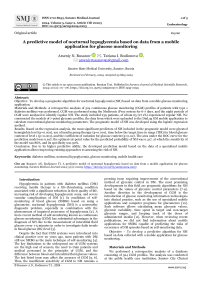A predictive model of nocturnal hypoglycemia based on data from a mobile application for glucose monitoring
Автор: Arseniy N. Rusanov, Tatiana I. Rodionova
Журнал: Saratov Medical Journal @sarmj
Статья в выпуске: 2 Vol.5, 2024 года.
Бесплатный доступ
Objective: To develop a prognostic algorithm for nocturnal hypoglycemia (NH) based on data from a mobile glucose monitoring application. Materials and Methods. A retrospective analysis of 524 continuous glucose monitoring (CGM) profiles of patients with type 1 diabetes mellitus was performed. CGM was performed using the Medtronic iPro2 system for 6-7 days, and the night periods of CGM were analyzed to identify regular NH. The study included 239 patients, of whom 65 (27.1%) experienced regular NH. We constructed the models of 7-point glycemic profiles, the data from which were uploaded to the DiaLog GM mobile application to calculate conventional glucose monitoring parameters. The prognostic model of NH was developed using the logistic regression method. Results. Based on the regression analysis, the most significant predictors of NH included in the prognostic model were glycated hemoglobin level (p=0.001), use of insulin pump therapy (p=0.001), time below the target time in range (TIR) for blood glucose content of level 1 (p<0.001), and the coefficient of variation for glucose content (p=0.02). The area under the ROC curve for the prediction model was 0.917; the optimal cut-point value for the predicted probability of NH was 0.317, at which the sensitivity of the model was 86%, and its specificity was 90%. Conclusion. Due to its higher predictive ability, the developed prediction model based on the data of a specialized mobile application allows improving existing approaches to assessing the risk of NH.
Diabetes mellitus, nocturnal hypoglycemia, glucose monitoring, mobile health care
Короткий адрес: https://sciup.org/149147113
IDR: 149147113 | DOI: 10.15275/sarmj.2024.0203
Список литературы A predictive model of nocturnal hypoglycemia based on data from a mobile application for glucose monitoring
- Yeh JS, Sung SH, Huang HM, et al. Hypoglycemia and risk of vascular events and mortality: A systematic review and meta-analysis. Acta Diabetol. 2016; 53 (3): 377-92. https://www.doi.org/10.1007/s00592-015-0803-3
- Klimontov VV. Impaired hypoglycemia awareness in diabetes mellitus: Epidemiology, mechanisms, and therapeutic approaches. Diabetes Mellitus 2018; 21 (6): 513-23. (In Russ.). https://www.doi.org/10.14341/DM9597
- Ólafsdóttir AF, Polonsky W, Bolinder J, et al. A randomized clinical trial of the effect of continuous glucose monitoring on nocturnal hypoglycemia, daytime hypoglycemia, glycemic variability, and hypoglycemia confidence in persons with type 1 diabetes treated with multiple daily insulin injections (GOLD-3). Diabetes Technol Ther. 2018; 20 (4): 274-84. https://www.doi.org/10.1089/dia.2017.0363
- Divan V, Greenfield M, Morley CP, Weinstock RS. Perceived burdens and benefits associated with continuous glucose monitor use in type 1 diabetes across the lifespan. J Diabetes Sci Technol. 2022; 16 (1): 88-96. https://www.doi.org/10.1177/1932296820978769
- Kompala T, Wong J, Neinstein A. Diabetes specialists value continuous glucose monitoring despite challenges in prescribing and data review process. J Diabetes Sci Technol. 2023; 17 (5): 1265-73. https://www.doi.org/10.1177/19322968221088267
- Schrangl P, Reiterer F, Heinemann L, et al. Limits to the evaluation of the accuracy of continuous glucose monitoring systems by clinical trials. Biosensors 2018; 8 (2): 50. https://www.doi.org/10.3390/bios8020050
- Klimontov VV, Myakina NE. Glucose variability indices predict the episodes of nocturnal hypoglycemia in elderly type 2 diabetic patients treated with insulin. Diabetes Metab Syndr. 2017; 11 (2): 119-24. https://www.doi.org/10.1016/j.dsx.2016.08.023
- Sakurai K, Kawai Y, Yamazaki M, Komatsu M. Prediction of lowest nocturnal blood glucose level based on self-monitoring of blood glucose in Japanese patients with type 2 diabetes. J Diabetes Complications 2018; 32 (12): 1118-23. https://www.doi.org/10.1016/j.jdiacomp.2018.09.007
- Wang S, Tan Z, Wu T, et al. Largest amplitude of glycemic excursion calculating from self-monitoring blood glucose predicted the episodes of nocturnal asymptomatic hypoglycemia detecting by continuous glucose monitoring in outpatients with type 2 diabetes. Front Endocrinol. 2022; 13: 858912. https://www.doi.org/10.3389/fendo.2022.858912
- Fleming GA, Petrie JR, Bergenstal RM, et al. Diabetes digital app technology: Benefits, challenges, and recommendations. A consensus report by the European Association for the Study of Diabetes (EASD) and the American Diabetes Association (ADA) Diabetes Technology Working Group. Diabetologia 2020; 63 (2): 229-41. https://www.doi.org/10.1007/s00125-019-05034-1
- Doupis J, Festas G, Tsilivigos C, et al. Smartphone-based technology in diabetes management. Diabetes Ther. 2020; 11 (3): 607-19. https://www.doi.org/10.1007/s13300-020-00768-3
- Dedov II, Shestakova MV, Mayorov AYu, et al. Algorithms of Specialized Medical Care for Patients with Diabetes Mellitus. I.I. Dedov, Shestakova M.V., Mayorov A.Yu. (Eds.). 11th edition. Diabetes Mellitus 2023; 26 (2S): 1-157. (In Russ.). https://www.doi.org/10.14341/DM13042
- American Diabetes Association Professional Practice Committee. 6. Glycemic Goals and Hypoglycemia: Standards of Care in Diabetes-2024. Diabetes Care 2024; 47: 111-25. https://www.doi.org/10.2337/dc24-S006
- Rusanov AN, Rodionova TI. A novel computer algorithm for calculating the mean amplitude of glycemic excursions using self-monitoring blood glucose measurements. Contemporary Issues of Science and Education 2020; (3): 132. (In Russ.) https://www.doi.org/10.17513/spno.29909
- Vu L, Kefayati S, Idé T, et al. Predicting nocturnal hypoglycemia from continuous glucose monitoring data with extended prediction horizon. AMIA Annu Symp Proc. 2020: 874-82. https://pubmed.ncbi.nlm.nih.gov/32308884
- Mosquera-Lopez C, Dodier R, Tyler NS, et al. Predicting and preventing nocturnal hypoglycemia in type 1 diabetes using big data analytics and decision theoretic analysis. Diabetes Technol Ther. 2020; 22 (11): 801-11. https://www.doi.org/10.1089/dia.2019.0458
- Zhang L, Yang L, Zhou Z. Data-based modeling for hypoglycemia prediction: Importance, trends, and implications for clinical practice. Front Public Health 2023; (11): 1044059. https://www.doi.org/10.3389/fpubh.2023.1044059
- Rodbard D. Glucose variability: A review of clinical applications and research developments. Diabetes Technol Ther. 2018; 20 (S2): S25-215. https://www.doi.org/10.1089/dia.2018.0092


